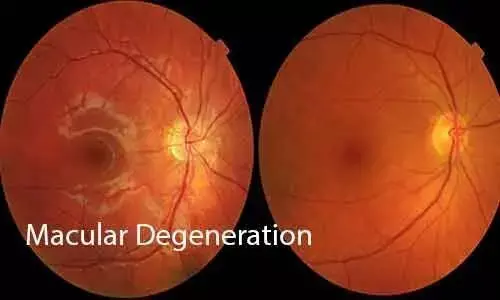- Home
- Medical news & Guidelines
- Anesthesiology
- Cardiology and CTVS
- Critical Care
- Dentistry
- Dermatology
- Diabetes and Endocrinology
- ENT
- Gastroenterology
- Medicine
- Nephrology
- Neurology
- Obstretics-Gynaecology
- Oncology
- Ophthalmology
- Orthopaedics
- Pediatrics-Neonatology
- Psychiatry
- Pulmonology
- Radiology
- Surgery
- Urology
- Laboratory Medicine
- Diet
- Nursing
- Paramedical
- Physiotherapy
- Health news
- Fact Check
- Bone Health Fact Check
- Brain Health Fact Check
- Cancer Related Fact Check
- Child Care Fact Check
- Dental and oral health fact check
- Diabetes and metabolic health fact check
- Diet and Nutrition Fact Check
- Eye and ENT Care Fact Check
- Fitness fact check
- Gut health fact check
- Heart health fact check
- Kidney health fact check
- Medical education fact check
- Men's health fact check
- Respiratory fact check
- Skin and hair care fact check
- Vaccine and Immunization fact check
- Women's health fact check
- AYUSH
- State News
- Andaman and Nicobar Islands
- Andhra Pradesh
- Arunachal Pradesh
- Assam
- Bihar
- Chandigarh
- Chattisgarh
- Dadra and Nagar Haveli
- Daman and Diu
- Delhi
- Goa
- Gujarat
- Haryana
- Himachal Pradesh
- Jammu & Kashmir
- Jharkhand
- Karnataka
- Kerala
- Ladakh
- Lakshadweep
- Madhya Pradesh
- Maharashtra
- Manipur
- Meghalaya
- Mizoram
- Nagaland
- Odisha
- Puducherry
- Punjab
- Rajasthan
- Sikkim
- Tamil Nadu
- Telangana
- Tripura
- Uttar Pradesh
- Uttrakhand
- West Bengal
- Medical Education
- Industry
New therapeutic approach may help treat age-related macular degeneration effectively

Philadelphia - Runt-related transcription factor 1 (RUNX1) has been linked to retinal neovascularization and the development of abnormal blood vessels, which result in vision loss in diabetic retinopathy. Now, scientists have found that RUNX1 inhibition presents a new therapeutic approach in the treatment of age-related macular degeneration (AMD), which is the leading cause of blindness in the elderly worldwide. Their results are reported in The American Journal of Pathology, published by Elsevier.
Abnormal growth of blood vessels, or aberrant angiogenesis, arises from the choroid, a part of the eye located behind the retina. This condition, known as choroidal neovascularization (CNV), is present in several ocular diseases that lead to blindness such as AMD. This study is the first to implicate RUNX1 in CNV and to test RUNX1 inhibition therapy for treating CNV. Researchers found that application of a RUNX1 inhibitor, alone or in combination with a standard treatment for AMD, may represent an important therapeutic advance.
"Incomplete response to anti-vascular endothelial growth factor (VEGF) drugs is a critical problem that hinders visual outcomes in CNV. RUNX1 represents a promising therapeutic target that may help address current limitations of anti-VEGF therapy," explains first author Lucia Gonzalez-Buendia, MD, a retina specialist at Puerta de Hierro-Majadahonda University Hospital (Spain), former postdoctoral fellow at the Schepens Eye Research Institute of Mass Eye and Ear, Department of Ophthalmology, Harvard Medical School, Boston, MA, USA.
Researchers induced CNV lesions in mice. Immediately thereafter the mice received a single intravitreal injection of saline, aflibercept (a Food and Drug Administration-approved treatment for VEGF), the RUNX1 inhibitor Ro5-3335, or a combination of Ro5-3335 and aflibercept. A single intravitreal injection of Ro5-3335 alone significantly decreased the CNV lesion size seven days after induction of the CNV lesions. The combination of Ro5-3335 and aflibercept reduced vascular leakage more effectively than aflibercept alone.
"RUNX1 inhibitors hold significant promise to complement or replace anti-VEGF therapies for patients in which anti-VEGF therapy is no longer effective, and with the potential to be administered topically it could be transformative in the field," suggests co-lead investigator Joseph F. Arboleda-Velasquez, MD, PhD, Assistant Scientist, Schepens Eye Research Institute of Mass Eye and Ear, and Assistant Professor of Ophthalmology, Harvard Medical School, Boston, MA, USA.
RUNX1 was detected in all cell types studied that are known to be involved in CNV pathogenesis, suggesting that RUNX1 inhibition may target not only angiogenesis, but also other processes important in CNV pathogenesis such as inflammation and fibrosis. It has the potential to impact a wide variety of ocular diseases including AMD, diabetic retinopathy, retinopathy of prematurity, retinal vein occlusions, and other angiogenic diseases of the eye.
"Demonstrating the potential of RUNX1 inhibition for the treatment of CNV beyond anti-VEGF therapy presents a unique approach for the treatment of exudative age-related macular degeneration and suggests the importance of future studies to test its efficacy in patients," concludes co-lead investigator Leo A. Kim, MD, PhD, Assistant Scientist, Schepens Eye Research Institute of Mass Eye and Ear, and Assistant Professor of Ophthalmology, Harvard Medical School, Boston, MA, USA.
Current treatment for AMD is invasive and loses efficacy over time. Patients are given multiple injections of anti-VEGF drugs into the eye. Around half of all patients report persistent retinal fluid arising from leaky blood vessels despite chronic treatment, which carries a substantial burden for these patients as well as the health system.
https://ajp.amjpathol.org/article/S0002-9440(20)30560-5/fulltext
Hina Zahid Joined Medical Dialogue in 2017 with a passion to work as a Reporter. She coordinates with various national and international journals and association and covers all the stories related to Medical guidelines, Medical Journals, rare medical surgeries as well as all the updates in the medical field. Email: editorial@medicaldialogues.in. Contact no. 011-43720751
Dr Kamal Kant Kohli-MBBS, DTCD- a chest specialist with more than 30 years of practice and a flair for writing clinical articles, Dr Kamal Kant Kohli joined Medical Dialogues as a Chief Editor of Medical News. Besides writing articles, as an editor, he proofreads and verifies all the medical content published on Medical Dialogues including those coming from journals, studies,medical conferences,guidelines etc. Email: drkohli@medicaldialogues.in. Contact no. 011-43720751


